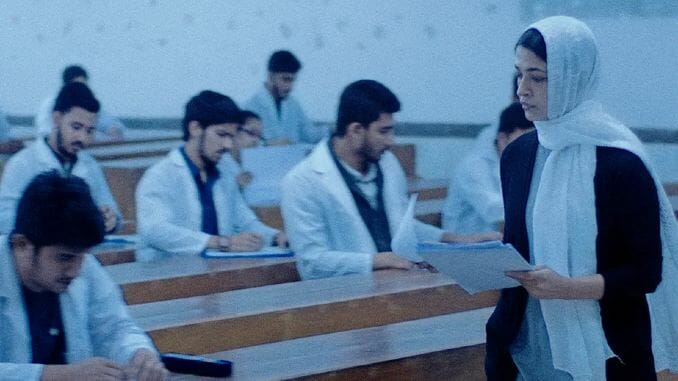The first thing you notice about Rehana is how blue it all is. Not blue as in risqué, or blue as in melancholy—each surface, each face, is bathed in a drab hue of cobalt or navy or cerulean. To call it color-grading feels like an understatement; this is more like color-smothering. And that overwhelming blanket of blue, literally and figuratively, shades everything.
Within this suffocating world resides the titular Rehana (Azmeri Haque Badhon), a professor at a medical school in Bangladesh. From the moment we meet her, furiously berating her brother via voice message (“Why are you not answering? Are you dead?!”), we know she’s at the end of her tether. A widow, she’s not only charged with the sole financial responsibility of her five-year-old daughter Emu (Afia Jahin Jaima), but of her unemployed brother and ailing parents. She rarely gets to see any of them, because she’s always working.
And her life at work is hardly a nourishing one. She has no real friends. While her male colleague Arefin (Kazi Sami Hassan) is beloved by the pupils, Rehana is disliked; her decision to expel a weeping student from an exam who’d written notes on her ruler proves particularly unpopular. Arefin suggests she should have been given another chance, but Rehana knows that once these students graduate, and have life and death choices to make, they won’t get second chances. So she can’t coddle feelings—the stakes are too high.
One evening, still at the school as usual, Rehana is walking past Arefin’s office when she hears something, and peeks through the door. Moments later, Annie (Afia Tabassum Borno), a clearly upset student, rushes out. He’s assaulted her. Rehana witnessed it. But Annie doesn’t want to say anything—she can already see where it all would lead, with the power imbalance and the inevitable victim-blaming. Rehana, though, is determined that he shouldn’t get away with it. So she hatches a plan: She’ll pretend that she was the one that Arefin assaulted. With so much on her plate, what’s this one extra thing? Inevitably, her scheme doesn’t go the way she intends.
Rehana, the sophomore feature from writer/director Abdullah Mohammad Saad, was the first Bangladeshi movie to be selected for Cannes, where it received a standing ovation. The clear #MeToo theme in Saad’s narrative undoubtedly helped get the film noticed on the global stage, and it’s the nuance to his handling of that theme—with the exception of a couple of unfortunately heavy-handed exchanges between secondary players—which makes it such an interesting work.
There’s no softness to Rehana’s demeanor. Not a hint of warmth. The toughness of her life is clear in her fatigued face; she does not have the physical or mental energy to tolerate any sort of weakness. When she has to be gentle with someone, out of pure necessity, you can see the sheer toll that it takes on her. Witnessing the misery that constitutes her life, though, it almost wouldn’t seem fair to expect her to be any other way. She’s carrying the burdens of multiple people, and she’s doing it alone. Arefin gets to skate by on charm, and be loved by his pupils, all while committing secret acts of sexual assault. The worst Rehana did—at least before her unravelling towards the end of the movie—is punish someone for cheating on a test, and she’s hated. Who wouldn’t be frustrated by a situation like that?
Bringing this complicated woman to life is Badhon; she only has a handful credits behind her (she actually trained as a dentist), but you’d never guess her relative inexperience from her performance in Rehana. Although there are other significant characters in the movie, she carries the vast majority of it squarely on her shoulders, and she does it in searing, unvarnished style. Badhon always keeps Rehana’s vulnerability close to the surface, right by her reckless determination to bring Arefin to justice.
That recklessness is the key to Rehana’s complexity. Saad is constantly weighing her “justice at all costs” mentality against the pragmatism of other women that she works with—primarily Annie, and the school’s principal. The film doesn’t suggest that their inaction makes them bad people, it just reflects their lived experience; they’ve so internalized the hopelessness of a society that lets men commit awful acts with no punishment, they are genuinely baffled by Rehana’s actions. Why hasn’t she learned how it is yet? What is she trying to prove? And as Rehana becomes ever more isolated by her quest, and frustrated by that isolation, she loses her grip.
Saad’s is a bleak film, as claustrophobic and oppressive as the unyielding blue that smothers each frame, and brave enough not to sacrifice honesty on the altar of catharsis. For Rehana, not submitting to the resignation of her peers means a lifetime of lonely battles, with infinitesimal hope of victory. “Are you doing this for her, or for yourself?” her brother asks during the painful final sequence, as she’s about to pull an uncomprehending, soon-to-be devastated Emu into her probably pointless fight. She doesn’t answer. There is no answer.
Director: Abdullah Mohammad Saad
Writer: Abdullah Mohammad Saad
Stars: Azmeri Haque Badhon, Kazi Sami Hassan, Afia Tabassum Borno, Afia Jahin Jaima
Release Date: October 10, 2021 (LFF)
Chloe Walker is a writer based in the UK. You can read her work at Culturefly, the BFI, Podcast Review, and Paste.
